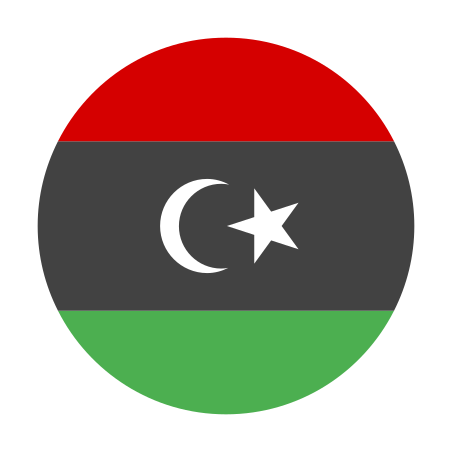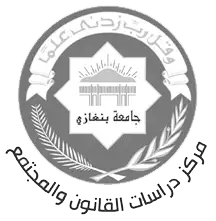Justice seeking and access to justice in Libya: Irregular female migrants in Benghazi
Some of the most vulnerable people in Libya, are the country's estimated 700,000 irregular or undocumented migrants. Their very stay in Libya constitutes a crime, and so they avoid state authorities when they can. Dr Hala el-Atrash's research revealed that when irregular migrant women appear before Libya’s justice system, it is often not as claimants or victims but as suspects.
This case study explores the injustices experienced by three irregular migrant women: Bilquis, Sarah, and Lisa. Their lives in their countries of origin in Sub-Saharan Africa had been full of hardship, poverty, and rights violations. Each left home risking her life to reach a better life. Yet on their journey to Libya, the women fell victim to deceiving smugglers and exploitative human traffickers. Once in Libya, they chose to live in Benghazi because they considered that life conditions there were better than in other Libyan cities. Still, in Benghazi they faced a new and complex series of violations by those who exploit their illegal status to intimidate and control them.
A central complexity in this case study, is that the three migrant women may simultaneously be seen as ‘victims’ or ‘criminals’. Victims because of the rights violations they suffered, and criminals because of their undocumented or illegal stay in Libya. Whereas in the other case studies, the protagonists actively approached state authorities, in this case study the protagonists have tried to evade pursuit by such authorities. For example, Bilquis suffered multiple violations and has never been inclined to demand justice; Sarah was a victim of human traffickers and did not seek justice – instead finding herself in front of the court as accused. Lastly, Lisa has spent years in Libya without demanding justice, but then found herself accused of witchcraft. In short: irregular migrant women are among the most vulnerable people in Libya and yet they do not appear in the eyes of Libya’s justice system as claimants or victims, but as suspects.
One reason why the women never sought justice, is that they did not consider their trafficking to Libya as an injustice. They wanted to come to Libya and accepted that the journey would involve risks and great costs. When they were wronged by others, they either accepted it or blamed themselves. When they arrived in Libya vastly indebted to their ‘sponsors’, they accepted that they would have to do unsalaried work to repay these sponsors.
Even when they considered the harms they suffered as ‘unjust’ and attributed blame to others, they have never sought to claim their rights or remedies before state bodies. Instead, they avoided state institutions out of fear of detention and deportation. Neither did the migrant women seek help of national or international human rights organisations. They also distrusted their own embassies or consulates and were skeptical of their ability to provide diplomatic protection or legal assistance. They had different ways of getting information and advice from unofficial actors: from a husband, friend, the leader of their country of origin’s community in Libya, or employer.
In Bilquis’ home country, her life was affected by war and poverty. She found a smuggler who said he could bring her out to a better place. She was skeptical about his ability to do so, but the smuggler brought her to Libya successfully. There she has to work for free to pay of her debt to her sponsor. She had no grievances about this, as she had migrated to Libya with this smuggler on her own volition and considered it only fair that she would have to do unsalaried labour on arrival to pay off her debt. But two other things happened in Libya, about which she did have grievances. First, the police broke into her house and took her simple belongings. Second, her employers did not pay her wages for several months and threatened that if she would object, they would hand her over to a detention centre. While Bilquis clearly was troubled by these grievances, she did not turn to any institution to claim any rights or remedies because she feared detention and deportation. She mostly blamed herself for the misfortunes she suffered. Although on paper her human rights to life, bodily integrity, and dignity may have been violated, she did not see things in this way.
On the first day of her journey to Libya, Sarah fell victim to human traffickers. On the way to Libya she was forcibly detained in informal detention centers for long periods, where she was blackmailed and tortured. For this she did not blame the human traffickers but rather her parents who pushed her to emigrate. Sarah never tried to seek justice for what happened to her on her journey. Instead, she found herself accused in front of a court for making and selling alcohol. Her experience there was terrible. Sarah only spoke limited Arabic, she did not know about her rights or the substantive and procedural rules, and her options for redress. Further, she had
no confidence that the judge was interested in her background story or the injustices she suffered. Sarah did not know how a lawyer was appointed, and anyway considered that a lawyer would be unaffordable for her, and that they would not speak one another’s language. The judge rules that she was to be deported – which Sarah considered a death sentence to her future hopes. Yet the chaotic security institutions and a violent clash prevented her deportation. When an armed group attached the Center for Combating Illegal Migration where Sarah was held, she found herself free.
Lisa faced a series of harmful experiences on her journey to Libya. She knew that her migration to Libya was not legal, but she had consented to it and had a good relation with the smuggler. She even indicated that she was expecting to make a similar arrangement for her planned onward journey to Europe. Like Sarah, Lisa found herself in court accused of practicing witchcraft and sorcery. The police had seized her savings and she had been blackmailed about this by a public official in the court corridors. So when she came before the judge, she dared not tell him about the police’s theft. Yet where Sarah had a bad lawyer, Lisa’s lawyer worked his personal connections. In this way, Lisa received an inventory card in a record period so that when the judge saw her, she was not charged with entering the country illegally. The lawyer also got her acquitted of the charge of practicing witchcraft, because this is criminalized in Libya only as a crime of fraud and the elements thereof were not available in her case.
The three women did not seek justices for the violations of their rights. This is due to a complex mix of obstacles and quite rational calculations. For one, the women knew full well that their irregular stay in Libya was criminalised and put them at risk of detention and deportation. They also feared that any criticism or claim against the traffickers might put their family in their country of origin at risk of retaliation. Second, they neither knew about their rights or Libya’s laws, nor did they have much faith in Libya’s security and justice institutions. Third, once they found themselves in court they were confused by its complicated processes and Arabic language, and left at the mercy of their lawyer. In one case that worked out poorly, in another Lisa was lucky with an active lawyer.
Libya has no policies or measures to protect migrant women from domestic violence and human trafficking crimes, or to encourage women to report safely and without fear for reprisals. Such measures might include witness protection programs and firewall policies which prevent health care providers and state bodies from sharing any personal data or information about irregular migrant women with security and immigration control agencies.
In this case study, the Libyan state failed to enshrine and protect the rights of migrant women. As migrants find that they have no path to justice in Libya, they lose trust in the country’s institutions and society. When conflicts do occur, they are forced to solve them outside the view of the state. Improving access to justice for this group would create a more just and accountable Libyan society
This summary was published in Suliman Ibrahim, Bruno Braak and Jan Michiel Otto (2022) 'The Long and Winding Road: Justice seeking and access to justice in Libya', Leiden/Benghazi: Van Vollenhoven Institute/Benghazi Centre for Law and Society Studies.




